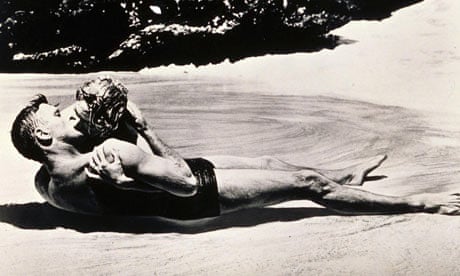It is one of the most celebrated images in cinema, an icon of heterosexual romance: Burt Lancaster and Deborah Kerr kissing as the waves crash over them in the 1953 film From Here to Eternity. But behind the Hollywood gloss is a tale of censorship and repression, with the author of the award-winning novel on which the film was based forced to remove scenes of gay sex from the manuscript before publication.
Kaylie Jones, a novelist in her own right, says her father, James Jones, was told by his publisher Scribner to eliminate both expletives and homosexual scenes in From Here to Eternity, which was based on his own experiences in Hawaii in the army on the eve of the Pearl Harbour bombing.
The original manuscript of From Here to Eternity went into "great detail" about the kinds of sexual favours soldiers like Private Angelo Maggio, played in the film by Frank Sinatra, would provide to rich gay men for money, Kaylie Jones revealed in an article written for US news website the Daily Beast.
"'I don't like to be blowed [by a man]'," the novel's hero Private Robert E Lee Prewitt tells Maggio in a section cut from the novel. "Angelo shrugged," writes James Jones. "'Oh, all right. I admit it's nothing like a woman. But it's something. Besides, old Hal treats me swell. He's always good for a touch when I'm broke. Five bucks. Ten bucks. Comes in handy the middle of the month ... Only reason I let Hal blow me is because I got a good thing there. If I turned him down I'd blow it sky high. And I want to hang onto that income, buddy.'"
James Jones initially refused to cut the expletives from his novel, writing to his Scribner editor that "the things we change in this book for propriety's sake will in five years, or 10 years, come in someone else's book anyway … and we will wonder why we thought we couldn't do it. Writing has to keep evolving into deeper honesty, like everything else, and you cannot stand on past precedent or theory, and still evolve … You know there is nothing salacious in this book as well as I do."
He then agreed to cut a "certain number" of uses of the word fuck from the book, his daughter wrote, "in part because there was a question whether the US postal system would even deliver the book to stores because of its 'salacious' nature", although 32 still remain. But he refused to eliminate the homosexual scenes in their entirety "because he felt this would be unfaithful to reality he witnessed", although they were extensively cut back when it was published in 1951.
James Jones, she wrote, "believed that homosexuality was as old as mankind itself, and that Achilles, the bravest and most venerated fighter ever described, was gay, and to take a younger lover under your wing was a common practice among the soldiers of the time". "He also believed also that homosexuality was a natural condition of men in close quarters, and that it in no way affected a soldier's capabilities on the battlefield. What would have amazed him is that the discussion still continues to this day, cloaked in the same hypocrisy and silence as it was 60 years ago," she wrote. The US military's current "Don't Ask, Don't Tell" policy allows gay men and lesbians to serve only if they keep quiet about their sexuality. President Obama has previously announced his intention to revoke the rule, but for the moment it remains in force.
Kaylie Jones told the Guardian that she decided to divulge the details following the recent death of her mother. "She didn't think this was relevant," Jones said. "Now that I'm executor of the literary estate with my brother, we think it's relevant given the Don't Ask, Don't Tell controversy in the American military [and] the Maine same-sex marriage vote."
"In some ways", she continued, the original novel was "a better book. The gay passages are not what I'd cut from the book. If we published a new edition, I would include them," she said. From Here to Eternity won America's National Book Award on publication in 1951, while the 1953 film won eight Oscars.
Publishers at the time, according to Kaylie Jones, were under pressure from a Catholic group called the National Organisation for Decent Literature, which objected to "the lascivious type of literature which threatens the moral, social and national life of our country" and blacklisted From Here to Eternity. Its members would visit booksellers with lists of "harmful" titles, informing the shops' managers if they found them in the stores. "The result? Widespread intimidation and boycott of booksellers," she wrote in her piece for the Daily Beast.
"Things are much better now for writers," she told the Guardian. "I think my father paved the way for many writers. He made the literary world safe for the F word."
